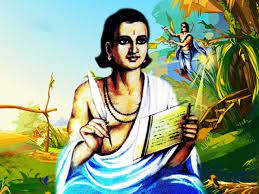In the rich tapestry of Indian literature, the name Kalidasa stands as a beacon of poetic excellence and literary genius. Revered as one of the greatest poets and playwrights in Sanskrit literature, Kalidasa’s works continue to captivate readers with their timeless beauty, profound wisdom, and exquisite craftsmanship. Let us delve into the life and literary legacy of this legendary figure who adorned the courts of ancient India with his poetic brilliance.
Little is known about the early life of Kalidasa, and much of what we know is gleaned from legends and folklore. According to tradition, he lived during the Gupta period, a golden age of Indian civilization, which flourished between the 4th and 6th centuries CE. Born in the town of Ujjain in present-day Madhya Pradesh, Kalidasa is believed to have risen from humble origins to become the poet laureate of King Vikramaditya’s court.
Kalidasa’s literary corpus comprises some of the most celebrated works in Sanskrit literature, including epic poems, lyrical compositions, and plays. His magnum opus, “Meghaduta” or “The Cloud Messenger,” is a lyrical masterpiece that showcases his unparalleled skill in weaving together vivid imagery, sublime emotions, and lyrical beauty. The poem narrates the tale of a lovelorn yaksha who sends a message to his beloved through a passing cloud, traversing the vast expanse of the Indian subcontinent and depicting its diverse landscapes and seasons along the way.
Another iconic work by Kalidasa is the timeless epic “Shakuntala,” which recounts the story of the virtuous maiden Shakuntala and her love affair with King Dushyanta. Infused with romance, drama, and elements of myth and legend, “Shakuntala” remains one of the most enduring and beloved works of Indian literature. Kalidasa’s portrayal of human emotions, moral dilemmas, and the timeless themes of love, duty, and destiny continue to resonate with readers across generations.
In addition to his poetic works, Kalidasa also excelled as a playwright, with his three surviving dramas—”Malavikagnimitra,” “Vikramorvasiya,” and “Abhijnanasakuntalam” (commonly known as “Shakuntala”)—ranked among the finest examples of Sanskrit drama. His plays are characterized by their intricate plots, vibrant characters, and lyrical dialogue, showcasing Kalidasa’s mastery of both form and content.
What sets Kalidasa apart as a poet and playwright is his ability to infuse his works with a profound sense of aesthetics, spirituality, and humanism. His poetry transcends the boundaries of time and space, offering insights into the human condition and the mysteries of existence. Kalidasa’s verses, with their sublime beauty and universal truths, continue to inspire artists, scholars, and seekers of wisdom across the globe.
Despite the passage of centuries, the legacy of Kalidasa endures as a testament to the enduring power of literature to transcend cultural, linguistic, and temporal barriers. His works continue to be studied, appreciated, and celebrated for their profound insights into the human experience and their timeless relevance to the modern world. As we pay homage to the poet laureate of ancient India, let us immerse ourselves in the timeless splendor of Kalidasa’s literature and revel in the enduring beauty of his words.






